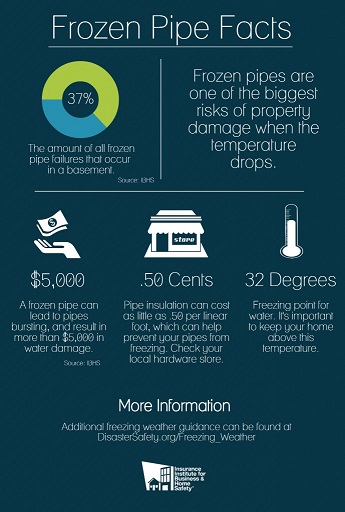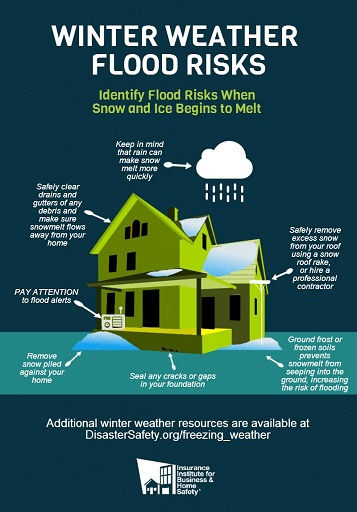Winter Weather


What to Prepare for?
During a severe cold spell, domestic and processing water systems, including water-based fire protection systems like automatic sprinklers, can freeze, expand, burst and when there is a thaw significant water damage can result. If the water leakage is not detected immediately and appropriate action taken, significant damage can be caused. Further, system freeze-ups can obstruct and render fire protection systems inoperable and useless in the event of a fire. Other related damage and impacts can result including:
- Freezing of tanking, controls and piping
- Roof collapse from ice dams and snow loading
- Power outages
- Equipment failure
- Limited working times outside
- Slip and fall exposure for employees and customers
How to Prepare?
Preparing is crucial. With winter weather conditions worsening, review the infographic below packed with tips for keeping your business safe. Here are some important tips to prepare for when severe cold weather is expected
- Assemble the Plant/Facility Emergency Organization Team, supplies and equipment at a designated safe location on site
- The Cold Weather Emergency Team should remain on site until the emergency has passed.
- Ensure that the Plant Emergency Organization have adequate supplies of non-perishable food, first aid equipment, lighting, two-way communication equipment and stored drinking water
- Establish emergency communication methods
- Inspect all fire protection equipment and leave in service and assure adequate heat is provided
- Verify all fire water tanks or reservoirs are full and protected from freezing
- If necessary, shut down operations and processes safely in accordance with OEM recommendations. Drain non-fire protection tanks and piping to prevent freezing
- Ensure that an adequate supply of fuel is available for all heating systems and emergency generators
- Ensure that the location has procured a supply of propane heating torches, electric portable heating devices, extra fuel for various equipment, etc.
- Turn off non-essential lighting, machinery and equipment. Anticipate power outages and surges; be prepared to shut down susceptible systems such as computers.
- Recommend early closing or delayed opening.
- Back up important computer data and records; and store backups in a safe location protected from cold weather, snow and wind
- Protect important paper records from cold weather, snow and wind
- When possible, move important equipment and stock if subject to potential collapse or other weather exposure. If equipment or stock cannot be relocated, consider additional protection with tarps, portable heaters, etc.
- Consider flooding potentials: (1) de-energize equipment which may be submerged (2) move equipment and stock to higher locations, or protect with sandbags (3) verify operation of pumps and other dewatering equipment
- Confirm snow removal contractor
- If 24 hour staffing is required, ensure that local hotel rooms are available and reserved for staff if transportation could be challenged


